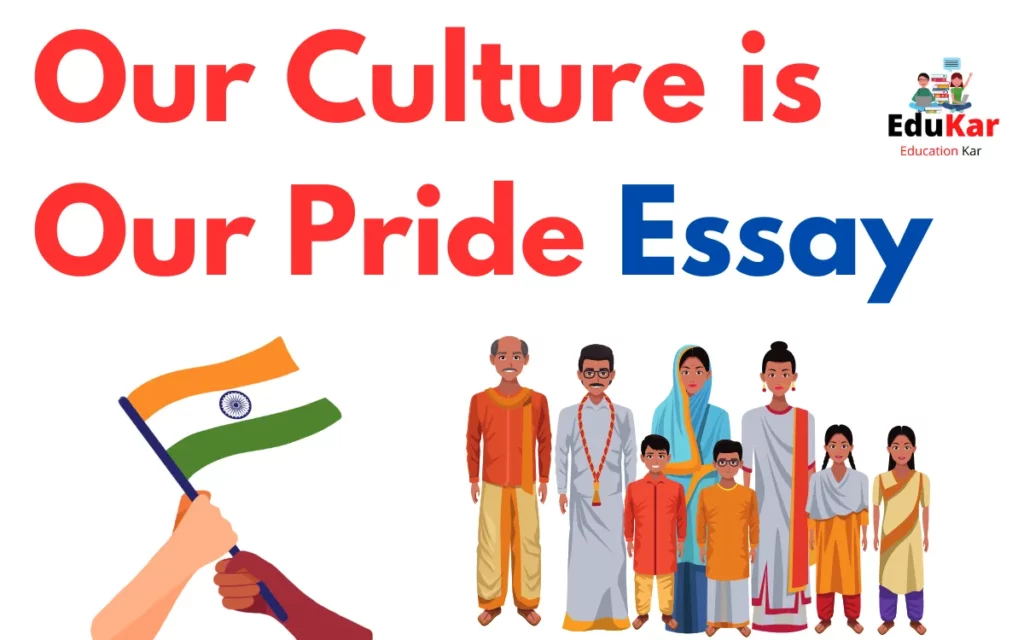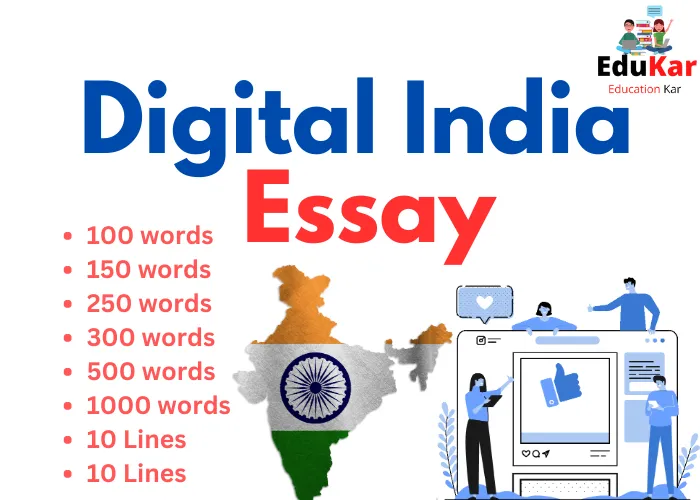Contents
Our Culture is Our Pride Essay discusses the importance of preserving and promoting Indian culture in the face of the challenges posed by globalization, westernization, and technological changes. The essay highlights the role of youth in preserving Indian culture and the benefits of doing so, including promoting cultural identity, fostering a sense of community and national unity, and promoting cross-cultural understanding and respect.

Introduction
Indian culture is a diverse and complex set of traditions, beliefs, customs, and practices that have evolved over thousands of years and are still evolving today. It is a rich and vibrant tapestry that is shaped by a variety of factors, including religion, geography, history, language, and ethnicity.
Some of the most prominent aspects of Indian culture include its ancient Vedic and Hindu traditions, which are marked by a deep reverence for the natural world and a belief in the cycle of birth, death, and rebirth. Other important cultural touchstones include the country’s diverse range of cuisines, its colorful festivals and celebrations, and its vibrant music, dance, and art.
The Diversity of Indian Culture
India is a vast country with diverse geography, ranging from the Himalayas to the Indian Ocean, and it has a population of over 1.3 billion people. The diversity of geography and population has led to a rich cultural heritage with distinct regional cultures. Each region has its own traditions, language, cuisine, and lifestyle, contributing to the country’s diversity. For instance, the North Indian culture is vastly different from the South Indian culture, with different languages, customs, and traditions. The East and West of India also have distinct cultures, making India one of the most diverse countries in the world.
The diversity of Indian culture is significant as it helps people understand the country’s richness and complexity. The cultural diversity provides an opportunity for people to learn from one another, appreciate each other’s differences, and create a sense of national identity that is inclusive and respectful of diversity. India’s diversity has also led to the creation of vibrant art, music, literature, and architecture, which have contributed to India’s cultural heritage.
Indian Cultural Traditions and Practices
India has a rich cultural heritage that is evident in its various traditions and practices. One of the most significant aspects of Indian culture is religion, with Hinduism being the predominant religion. Other religions such as Islam, Christianity, Sikhism, and Buddhism are also widely followed in India. Each religion has its own set of traditions and practices that are unique to the Indian subcontinent.
Indian music and dance are also significant aspects of Indian culture. Classical Indian music is considered to be one of the most complex and sophisticated music traditions in the world, with a long history of more than 2000 years. Indian dance forms are equally diverse, with classical dance forms such as Bharatanatyam, Kathak, and Odissi, and folk dances such as Bhangra, Garba, and Dandiya. Festivals are also an essential aspect of Indian culture, with each region celebrating its festivals with great enthusiasm. Some of the major festivals in India include Diwali, Holi, Eid, Christmas, and Durga Puja.
The traditions and practices in Indian culture are significant as they provide people with a sense of belonging, community, and spiritual fulfillment. They also help to promote the country’s identity and create a sense of unity among people of diverse backgrounds.
Indian Culture and the Modern World
Indian culture has had a significant impact on other cultures around the world. India’s influence on world literature, art, music, and philosophy can be traced back to ancient times. The spread of Buddhism and Hinduism to other parts of the world has also contributed to India’s cultural influence.
Indian culture has also adapted to the modern world, with many aspects of Indian culture gaining popularity globally. Indian cuisine is one of the most popular in the world, with dishes such as curry and biryani becoming popular in Western countries. Indian music, dance, and cinema are also gaining popularity, with Bollywood movies being watched globally. The popularity of yoga and meditation also reflects India’s cultural influence on the modern world.
Challenges to Indian Culture
India’s cultural heritage faces several challenges, including globalization, westernization, and technological changes. The influence of Western culture is rapidly increasing in India, especially among the younger generation. The rise of social media, the internet, and the entertainment industry has exposed young people to Western culture, leading to a decline in traditional values and practices.
The impact of globalization is also a significant challenge, with foreign companies and products competing with Indian goods and services. The increasing homogenization of global culture has led to the erosion of unique cultural identities and traditions, including Indian culture.
Technological changes are also posing challenges to Indian culture, with the rise of digital platforms, leading to the loss of cultural heritage. The digitization of books, music, and art has made them more accessible to a global audience, but it has also led to the loss of traditional knowledge and practices.
It is essential to address these challenges to preserve and promote Indian culture. Strategies such as education, awareness, and support for traditional artisans and artists can help to promote cultural heritage and support their livelihoods. Encouraging the use of traditional and eco-friendly products can also help to promote cultural sustainability.
The Role of Youth in Preserving Indian Culture
The youth play a critical role in preserving and promoting Indian culture. Young people are the future custodians of India’s cultural heritage and must be encouraged to take an active interest in their cultural roots. The youth can preserve Indian culture in several ways, including:
- Learning about their cultural heritage: Young people can learn about their cultural heritage by attending cultural events, visiting museums and historical sites, and reading books and articles about Indian culture.
- Promoting cultural exchange: Young people can participate in cultural exchange programs, learn about other cultures, and share their own culture with others. This helps to promote cross-cultural understanding and appreciation.
- Supporting traditional artisans and artists: Young people can support traditional artisans and artists by purchasing their products, attending their performances, and promoting their work.
- Using social media to promote Indian culture: Young people can use social media platforms to promote Indian culture and showcase its diversity and richness.
The benefits of preserving Indian culture for future generations are significant. Preserving Indian culture promotes a sense of identity, provides a source of pride, and helps to create a sense of community and national unity. It also promotes cross-cultural understanding and promotes India’s cultural influence globally.
Conclusion
Indian culture is our pride, and it is essential to preserve and promote it in the face of the challenges posed by globalization, westernization, and technological changes. The diversity of Indian culture, its traditions and practices, and its influence on the modern world make it a unique and valuable heritage. The youth play a crucial role in preserving and promoting Indian culture, and they must be encouraged to take an active interest in their cultural roots. Preserving Indian culture is not only essential for maintaining cultural identity but also for promoting cross-cultural understanding and respect, fostering a sense of community and national identity, and promoting India’s cultural influence globally.
FAQs:
What is the role of youth in preserving our culture?
The youth play a critical role in preserving our culture. They can learn about their cultural heritage, promote cultural exchange, support traditional artisans and artists, and use social media to promote Indian culture.
Why is it important to preserve our culture?
Preserving our Indian culture is important because it promotes a sense of identity, provides a source of pride, and helps to create a sense of community and national unity. It also promotes cross-cultural understanding and promotes India’s cultural influence globally.
What are the benefits of preserving ourculture?
The benefits of preserving our culture include promoting cultural identity, fostering a sense of community and national unity, promoting cross-cultural understanding and respect, and promoting India’s cultural influence globally. It also provides a source of pride and helps to preserve traditional knowledge and practices.












![Essay on Cricket for Students [ 250, 500 & 100 words] Essay on Cricket](https://edukar.in/wp-content/uploads/2023/01/Essay-on-Cricket-for-Students-1024x640.webp)

![Water is Life Essay in English [Class 4th, 5th, 6th,7th, 8th, 9th, 10th] Water is Life Essay](https://edukar.in/wp-content/uploads/2023/02/Water-is-Life-Essay-1024x640.webp)

